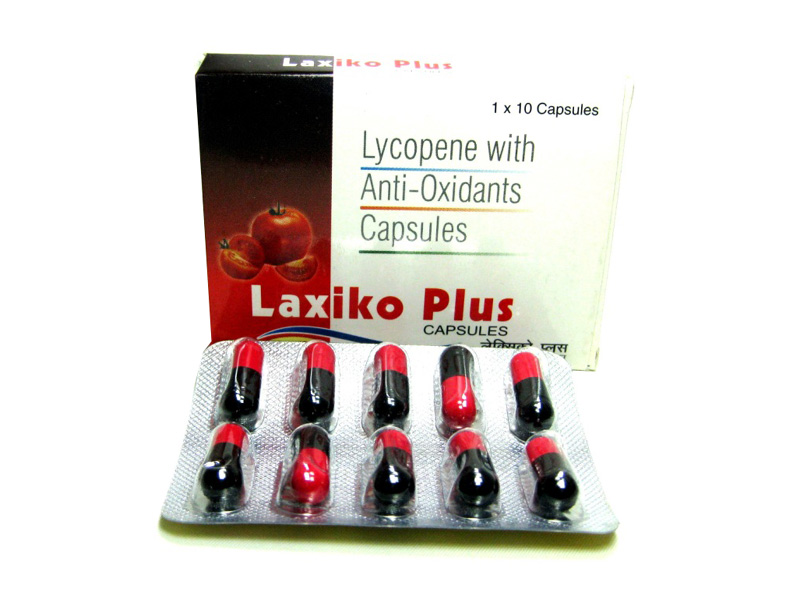LAXIKO PLUS
Lycopene (10%) (2000 mcg), Vitamin A Concentrate (Powder from as Acetate ) (5000 I.U.), Vitamin E Aceetate (15 mg), Vitamin C (75 mg), Zinc Sulphate (7.5 mg), Copper Sulphate (1 mg), Manganese Sulphate (1.5 mg), Beta Carotene (10% Dispersion) (10 mg), Selenium (As Selenium Dioxide) (150 mcg)
Lycopene is a naturally occurring chemical that gives a red color to fruits and vegetables. It is one of several pigments called carotenoids. Lycopene is found in watermelon, pink grapes, apricots, and pink guava. It is found particularly high in tomatoes and tomato products. People take lycopene to prevent heart disease, “hardening of the arteries” (atherosclerosis); And cancer of the prostate, breast, lung, bladder, ovary, colon, and pancreas. Lycopene is also used to treat human papillomavirus (HPV) infection, a major cause of uterine cancer. Some people also use lycopene for cataracts and asthma.
Selenium is used for selenium deficiency, a disease that causes underactive thyroid (autoimmune thyroiditis) and high blood pressure during pregnancy. It is also used for heart and blood vessel diseases, including stroke, complications from statin medications, and abnormal cholesterol levels, as well as many other conditions. Selenium has been used in alternative medicine to treat Hashimoto’s thyroiditis (an autoimmune disorder of the thyroid) and treat high cholesterol.
Copper sulfate is used to help in public health and safety. In addition to preventing athlete’s foot, it destroys algae and bacteria from the growth of algae in the swimming pool, a fungal infection that grows between the toes in a hot climate (such as an indoor swimming pool).

Mechanism of Action
Lycopene acts as a very powerful antioxidant. lycopene can trap single oxygen and reduce mutations in the AMES test. Lycopene at physiological concentrations can inhibit human cancer cell growth by interfering with growth factor receptor signaling and cell cycle progression, especially in prostate cancer cells without evidence of toxicity or apoptosis. Lycopene is a powerful antioxidant that can help protect cells from damage.
Vitamins are important for normal metabolism in the body. Vitamins vary in their chemical composition and are supplied in small amounts in the diet because they are not synthesized in the body or the rate of their production is not sufficient for the maintenance of health (eg tryptophan to niacin synthesis. ) There may be a deficiency of vitamins in the body. Various vitamin preparations are available for prophylaxis and treatment, most of the vitamins are non-toxic but have a long-term intake of a Vit. A. and Vit. D can cause toxicity. Vitamins are classified into two groups. The water-soluble vitamin B-complex group, vitamin C. II. Fat-soluble vitamins Vitamin A, Vitamin D, Vitamin E, Vitamin K.
Beta-carotene is a carotenoid. Carotenoids are red, orange, or yellow, fat-soluble compounds. These compounds are naturally present in many fruits, grains, oils, and vegetables. Alpha, beta, and gamma carotene are considered provitamins because they can be converted into active vitamin A. Beta-carotene is good for vision, immunity, and overall health.
Pharmacokinetic Properties:
Pharmacokinetic analysis was performed on plasma concentration-time data of 25 healthy male subjects. The plasma-concentration time data included measurements of total, trans-, and cislycopene concentrations from hours zero (0) until 672 h following lycopene administration. In addition, plasma concentration-time data included measurements of chylomicro concentrations of total, trans-, and cis-lycopene from hours zero (0) until 12 h following lycopene administration. The concentration-time data from each matrix was corrected by subtracting the plasma lycopene concentration at time zero (baseline) before the pharmacokinetic analysis of the data was performed. Only concentrations with a positive value were used in pharmacokinetic analysis.
Drug-Drug interactions:
If your doctor has directed you to use this medicine, your doctor or pharmacist may already know about any possible adverse interactions and you can monitor them. Do not start, stop, or change the dose of any medicine before checking with your doctor, health care provider, or pharmacist first.
Lycopene has no serious interaction with other drugs. It has no serious interaction with other drugs. It has no moderate interaction with other drugs. It has no minor interaction with other drugs.
This information does not include all possible interactions or adverse effects. Therefore, before using this product, tell your doctor or pharmacist about all the products you use. Keep a list of all your medicines with you, and share this information with your doctor and pharmacist. Contact your health care professional or physician for additional medical advice, or if you have or have health questions, concerns, or more information about this medication.
Precautions:
Do not start, stop, or change the dose of any medication before checking with your doctor, health care provider or pharmacist first. Lycopene has no serious interaction with other drugs. Lycopene has no moderate interaction with other drugs.
Pregnancy and breast-feeding:
Lycopene is likely safe during pregnancy and breastfeeding when usually found in foods. However, Lycopene is possibly unsafe when used during pregnancy and breastfeeding. A study of a specific lycopene supplement (LycoRed) suggested that taking lycopene 2 mg daily starting at 12-20 weeks of pregnancy and continuing until delivery might increase the rates of premature births and low birth weights. If you are pregnant or breastfeeding, avoid using lycopene in greater amounts than diets usually found in foods.
Surgery: Lycopene can slow blood clotting. This may increase the risk of bleeding during and after surgery. Stop using lycopene supplements at least 2 weeks before a scheduled surgery.
Fertility:
Lycopene – a nutrient found in tomatoes – may boost sperm quality, a study has suggested. Healthy men who took the equivalent of two tablespoons of (concentrated) tomato puree a day were found to have better quality sperm. Male infertility affects more than half of couples who cannot conceive. lycopene is a powerful antioxidant, which can help increase your fertility.
Dosage:
The appropriate dose of lycopene depends on many factors such as the user’s age, health, and many other conditions. At this time there is not enough scientific information to determine the proper dose range for lycopene. Keep in mind that natural products are not always safe and supplements may be important. Be sure to follow the relevant instructions on the product label and consult your pharmacist or physician or other health care professional before using.
Duration of action:
A half-life of about 2–3 days can be considered for it when consumed.
Adverse Reaction:
Lycopene is non-toxic and commonly found in the diet, mainly from tomato products. There are cases of intolerance or allergic reaction to diet-related lycopene, which can cause diarrhea, nausea, abdominal pain or cramps, gas, and decreased appetite. Lycopene may increase the risk of bleeding when taken with anticoagulant medications. lycopene may be the cause of low blood pressure, interactions with medications that affect blood pressure may occur. Lycopene can affect the immune system, nervous system, sensitivity to sunlight or medications used for stomach diseases. Lycopenia is an orange discoloration of the skin seen with high intake of lycopene. Discoloration is expected to fade after stopping excessive lycopene intake.
Storage:
Store in cool and dry place.
Overdosage:
Overeating lycopene can cause a condition called lycopenia, which is an orange or reddish discoloration of the skin. The condition itself is harmless and goes away by eating a diet low in lycopene.
Contraindictions:
Lycopene is available as a supplement, but should be avoided for people who are pregnant or breastfeeding because some research has found that taking a daily supplement increases the risk of premature birth and low birth weight.
Side effects:
This document does not cover all possible side effects and others that may occur. Check with your doctor for additional information about side effects.
Warnings:
This drug contains lycopene. If you are allergic to lycopene or any of the ingredients contained in this medicine, do not take all-trans lycopene, sai-carotene, sai-sai-carotene, or solanbruin.
Keep out of reach of children. In case of an overdose, seek medical attention or contact a toxin control center immediately.
